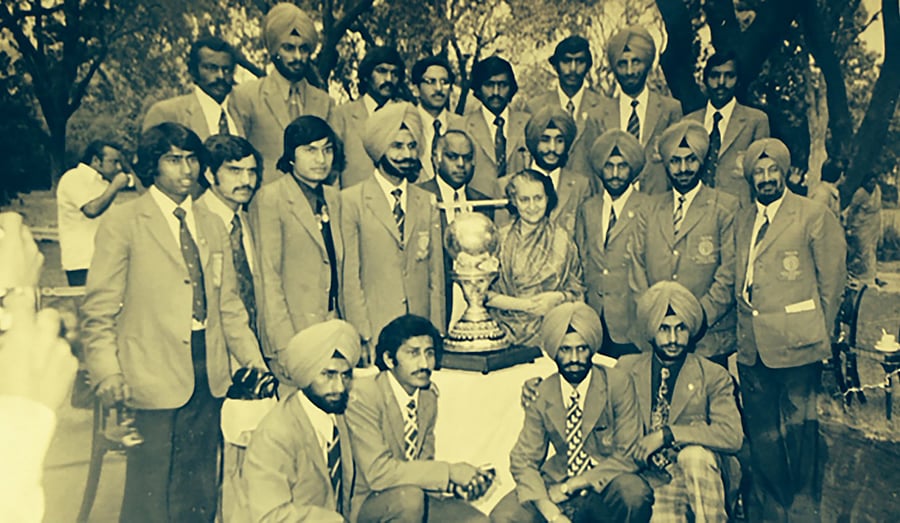
The victorious Indian team poses with the 1975 World Cup trophy along with then Prime Minister Indira Gandhi. BY
Credit: Special arrangement/ ASHOK KUMAR D
As we celebrate the Golden Jubilee of India winning the hockey World Cup in 1975, the achievement needs to be put in perspective, considering the profound impact it had on Indian psyche, but the epochal moment that was not leveraged to further uplift the profile of hockey. The triumph on this day 50 years ago remains unmatched and thus retains its uniqueness. The stat that India have not made even the medal round since then only adds lustre to the historic win in Malaysia.
Fifty years ago, sport was a way of life in India and not a career option. Hockey, floating along merrily on the back of seven gold medals (until another was added in 1980), was as big if not bigger than cricket, boasting of a huge legion of fans. Even local league, collegiate and inter-school competitions attracted spectators in their hundreds. The Media (print) coverage was simply monumental (when compared to these days). Being a hockey player was a matter of pride. The top guns were recognised, revered and worshipped by just about everyone who followed sport in India at the time.
It was in this environment that India, under Ajitpal Singh, won the World Cup in a wet and soggy Kuala Lumpur, Malaysia, defeating Pakistan 2-1 in the final, on March 15, 1975, in front of a capacity crowd at the iconic Stadium Merdeka. The Indians showed rare character to turn back a one-goal deficit and come through on goals by Surjit Singh and Ashok Kumar, the son of legendary Dhyan Chand. The achievement triggered euphoria , the likes of which have never been witnessed again. The players were feted like the royalty on their return to India.
It was an era when TV was a rarity. There was no cell phone or social media. “Internet” was not part of popular lexicon. As a college student then in Madras (now Chennai), I, like many others, followed the World Cup on the radio. We hung on to every word that commentator Jasdev Singh uttered. Our heartbeat was in sync with the modulations of his voice as he described the ebb and flow of the proceedings in his inimitable style. In fact, Jasdev ji enjoyed a near cult-figure status and was as popular as the hockey stars themselves! He was the hockey version of renowned commentators of the time, cricket’s John Arlott and VM Chakrapani.
Ajitpal’s Indian team landed in Malaysia, still hurting from the twin disappointments of 1971 (bronze in the inaugural edition) and 1973 (runners-up to Holland after missing a penalty stroke in extra-time). They suffered a shock defeat to Argentina in the league phase but picked up enough points for a semifinal clash with Malaysia. In a rousing encounter, India bounced back after being twice in arrears to force extra-time after a 2-2 tie with Shivaji Pawar scoring the first equaliser and then full-back Aslam Sher Khan from a penalty corner within two minutes after replacing Michael Kindo. In the extra-time that followed, Harcharan Singh struck the match-winner, pouncing on a deflection off a defender’s stick.
The final between India and Pakistan, who hammered West Germany 5-1 in the other semifinal, was a battle of nerves. Zahid Sheikh, whose nephew Shahnaz was to become a legendary forward in the future, put Pakistan in the front with a 17th minute strike, but Surjith Singh equalised in the 44th before Ashok Kumar scored the match-winner in the 51st which was hotly disputed by the Pakistanis who felt Malaysian umpire G Vijayanathan had erred in awarding the goal. But the replays of the film next morning exonerated the umpire.
The 1975 World Cup team, coached by Gurcharan Singh Bodhi, oozed with talent, characters –both fiery and calm, robust forwards, a tough half-line led by Ajitpal himself, a rugged bunch of defenders backed by rock-solid goalkeepers. In essence, it was a complete, wholesome team with the inspirational Balbir Singh Sr (Dosanjh) as the manager.
It was a triumph like no other and even after half-a-century, it still triggers emotions just like it did back in the college days!
(Anand Phila is a senior sports writer)